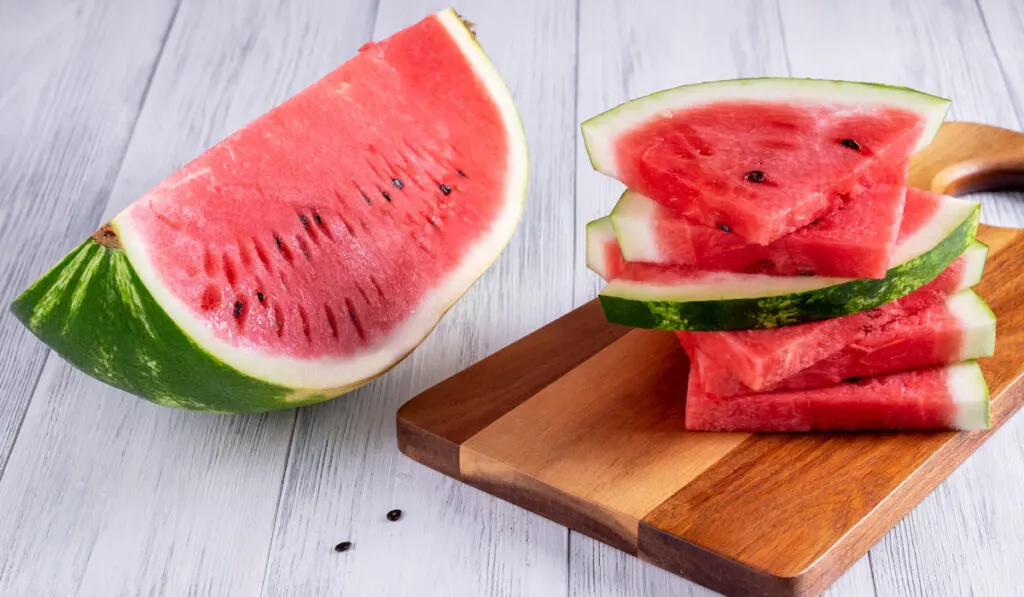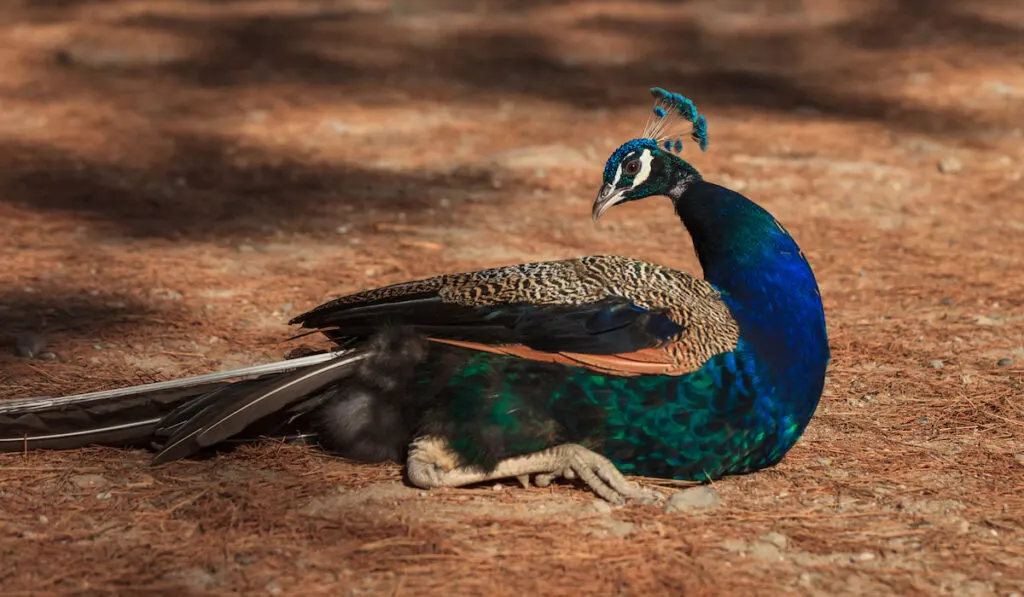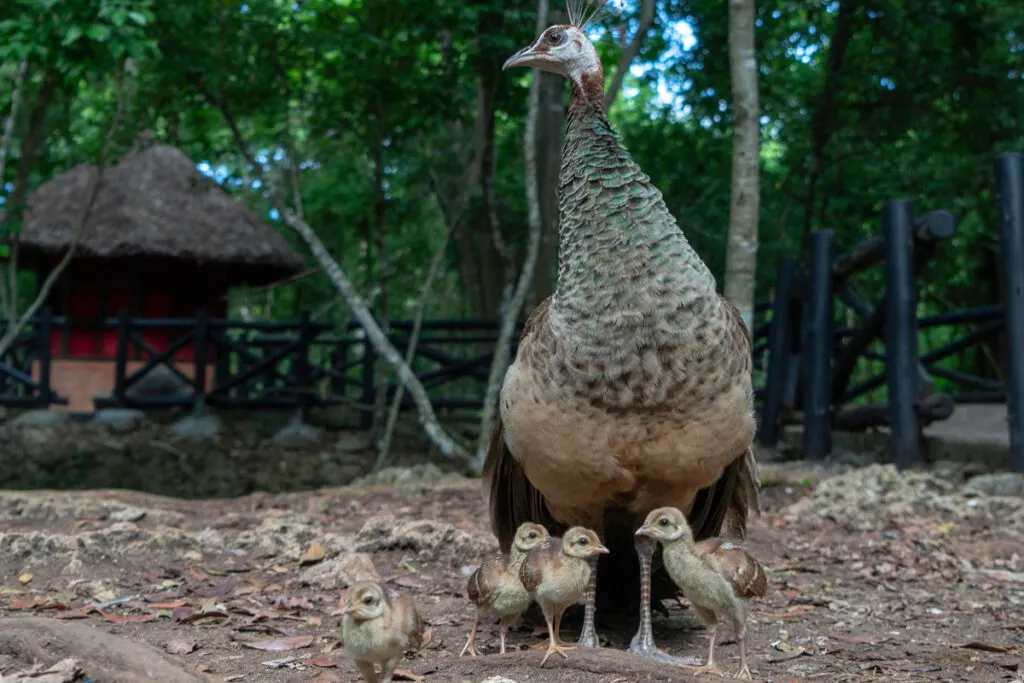Table of Contents
What Do Peacocks Eat?
Peacocks, or peafowl, are omnivorous birds. For the most part, they are not picky, but fairly opportunistic eaters. They will eat almost anything they find edible, and if you don’t cover your trash can, you will often find them pulling through the cans looking for tasty treats.
For optimal growth and health, the peafowl diet should mainly be composed of proteins because out in the wild, they always forage for insects, seeds, lizards, frogs, plants, flower petals, small rodents, and snakes.
Similarly, for those in captivity, you should emulate their diet in the wild and maintain the high protein diet necessary to keep them healthy with foods like nuts, cheese, scrambled eggs, kitchen scraps, and even cat food.
Fruits and vegetables are also good for your peacock, but can they eat watermelon? Let’s find out.
Can Peacocks Eat Watermelon?
Peafowl love watermelon. Watermelons have large seeds that carry several nutrients essential for the peafowl’s diet.
However, watermelons have a high water concentration and should be sparingly fed to the peafowl, most preferably as treats.
If consumed in excess, the peafowl might bloat or have more severe problems with its delicate digestive system. Overfeeding can also lead to over-accumulation of potassium and lycopene, and this might not be good for your peafowl.
On the other hand, peafowls do not eat the watermelon rind. Although they may appear to be eating it, they are only tearing through the rind to reach what is within the fruit.
Nutritional Value of Watermelons
Watermelons are composed largely of water (approximately 92 percent of the fruit) but are also packed with lots of minerals and vitamins essential for the well-being of the peacock. Besides being rich in vitamin A, vitamin B6, and vitamin C, watermelons are also packed with lots of antioxidants, amino acids, lycopene, and traces of potassium.
Furthermore, watermelons are sodium-free, fat-free, cholesterol-free, and contain 40 calories per cupful, making them an excellent option for treating your peafowl, as there are no risks related to fat.
Among other nutrients in watermelons are proteins, iron, calcium, fiber, and natural sugars.
Watermelons also have the highest concentration of lycopene, a phytonutrient that naturally occurs in vegetables and fruits.
This lycopene has anti-inflammatory properties, and just like in humans, it reacts with the peafowl’s body cells to trigger healthy reactions in the body.
Lycopene is also responsible for the red pigmentation that gives watermelons, guava, red grapes, and tomatoes their color. Besides, lycopene has also been associated with bone health, heart health, and cancer prevention.
However, to maximize their intake, you should let the watermelon be fully ripe for higher concentrations of lycopene. Furthermore, other antioxidants present in the watermelon, like beta-carotene and phenolic anti-oxidants, also increase gradually with the ripening of the watermelon.
Health Benefits of Watermelon

As discussed above, watermelons are rich in minerals and nutrients essential for the peafowl’s health. However, it is not good enough just to say they are beneficial to the peacock. How do these nutrients impact the peafowl’s health? Let’s have a detailed view below.
- Hydration – Since watermelons are especially high in water, they help the peafowl with their overall hydration. Furthermore, their juice has electrolytes that help mitigate and prevent heatstroke, generally helping to cool down the peafowls’ bodies.
- Digestion – Watermelons are high in both water and fiber, both of which help your peafowl, and are essential to maintaining a healthy digestive tract.
- Heart Health – Watermelons help in maintaining your peafowl’s heart health. They are rich in citrulline, an amino acid that converts into the amino acid arginine, primarily responsible for encouraging blood flow. Ultimately, this can lead to improved blood flow and improved cardiovascular health for your peacocks.
- Cancer Prevention – Rich in several antioxidants like lycopene, watermelons, through their anti-oxidant properties, are essential in preventing any harmful reactions in the peafowl’s body that could lead to chronic illnesses like cancer.
- Anti-inflammation – Lycopene, among other antioxidants present in the watermelon, makes the fruit an anti-inflammatory fruit. These anti-oxidants neutralize any free radicals as well as inhibit any inflammatory processes in the peafowl’s body, primarily improving and boosting the peafowl’s overall health and immunity.
Effects of Overfeeding

As aforementioned, watermelons should be sparingly fed to peafowl in a regulated manner, most preferably as treats, to avoid the risk of overfeeding that may lead to over-accumulation of potassium and lycopene. However, when consumed in reasonable amounts, there should not be any serious side effects.
If overfed with watermelons, peafowl might have bowel complications like bloating, indigestion, and diarrhea. This is primarily because of the high water content in watermelons. A few chunks of the fruit should be enough for a peacock in one feeding session.
Overfeeding could also lead to the accumulation of high levels of potassium. This is not good for your peacock’s heart health. In the appropriate amounts, watermelons give a healthy amount of potassium but when overfed, the story changes altogether.
Too much potassium in your peafowl’s system can result in reduced heartbeats and other cardiovascular complications. It can also lead to reduced muscle control, the reason why your peafowls might behave lazily after over-consuming watermelons.
If you have overweight peafowls, you can also be tempted to load up their diet with watermelons in a bid to reduce their weight. Introducing watermelons might be a good idea, but overfeeding is a bad one.
It is healthy to feed them watermelons but to effectively reduce the weight, you should feed diverse fruits and not only overfeed them with watermelons. This doesn’t imply that they won’t lose weight. Yes, they will, but it will mainly be the muscle weight lost, and they would look feeble and fragile.
Watermelons are also high in natural sugars, and although they are natural, they are still sugars, and overfeeding your peafowls with watermelons means that you are overfeeding them with natural sugars too. If not controlled, this might lead to other health complications.
Can Peachicks Eat Watermelon?
Since peachicks emulate what their parents do, what you avail for the peafowl is what the peachick will eat. Since they are young and their beaks might not be strong enough, it is advisable to peel off the watermelon rind to help the young ones bite easily on the watermelon.
However, if you wish to feed them separately from their parents, you may keep them in a different enclosure, and give them quality peachick feeds, with appropriate protein content depending on their ages. As they grow older, you may transition them to the normal peafowl feed.
Remember, watermelons are only fed to the peachicks as occasional treats too.

What to Avoid Feeding Peacocks
Generally, most human foods should not be fed to peafowls, as they may have preservatives, wheat, added sugars, and colorants, among many other ingredients that may be toxic to your peafowls.
Most human foods are also low in overall nutrition, and they could instead end up hurting the peafowl’s fragile digestive tract. Since peafowl know no boundaries and go about foraging for food anywhere, you should store the “foreign” foodstuffs far away from your peafowl.
Conclusion
Watermelons help boost the immunity and improve the health of your peafowl, only when fed in the right amounts. As evidenced by the peafowl that often eat fruits and vegetables, including watermelons, they develop stronger immune systems and have healthier bodies compared to those that do not.
Apart from watermelons, peafowls eat a wide range of fruits and vegetables including kales, pineapple, cabbage, papaya, bananas, celery, carrot tops, green grass, and kitchen scraps. To learn more you can check on this article.
Resources:
- https://www.purinamills.com/chicken-feed/education/detail/beyond-backyard-chickens-raising-peacocks-and-game-birds
- https://www.livescience.com/46019-watermelon-nutrition
- http://www.millenniumpost.in/sundaypost/insight/sundaypostinsight
- https://www.haiths.com/peacock
- https://petkeen.com/what-do-peacocks-eat-in-the-wild-and-as-pets
